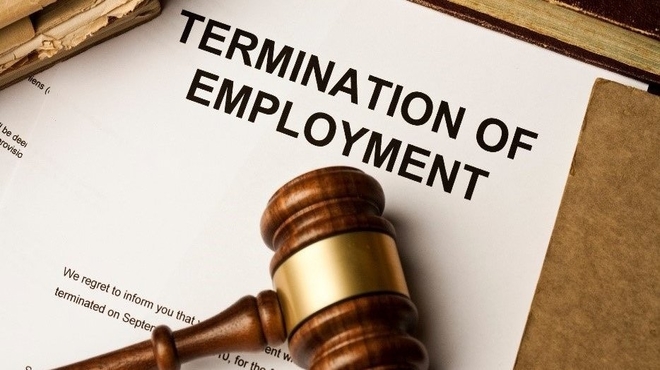Illegal Termination and Salary Due Recovery
April 07, 2024 हिंदी में पढ़ेंTable of Contents
- What is Illegal or Wrongful Termination?
- Ways in & Grounds upon which an Employee could be Terminated Wrongfully
- Laws against Illegal or Wrongful Termination
- Legal Remedies and Recovery of Salary
- Documents required by Employee for Legal Notice and Lawsuit
- Why do you need a Lawyer?
- 1. Discrimination
- 2. Violation of agreement/contract
- 3. Personal bias and other factors
- 1. Grievance letter to the company/employer
- 2. Legal Notice
- 3. Suit
What is Illegal or Wrongful Termination?
Illegal or wrongful termination is when you get fired or thrown out of your job even for no fault of yours i.e. without any sufficient cause or reason - may be due to a personal conflict that you may have with your employer, or if your employer is downsizing, etc. Such instances of sudden termination can be a huge emotional and financial blow and thus it is imperative for an employee to be aware of the laws in India that govern such illegal or wrongful terminations. Illegal termination is one of the most commonly occurring employment disputes in India. Each year, many employees face wrongful termination and are left stranded with no financial support. If you are an employee or even an employer, you must read this article to understand the legal implications of and remedies available against illegal or wrongful termination.
Ways in & Grounds upon which an Employee could be Terminated Wrongfully
An employee could be terminated on either fairgrounds or unfair grounds. When an employee is terminated on fair or valid grounds, it is not illegal termination. These fairgrounds may include misconduct, non-performance, dishonesty regarding qualifications or experience, theft of information, sexual harassment, wilful disobedience, damage to employer's property, etc. Such grounds are usually mentioned in the contract between employee and employer. If dismissal is based on an employee's behavior as per these grounds mentioned in the agreement, it is fair dismissal. However, there are many instances where the grounds of termination of an employee are either arbitrary or ambiguous. It could seem as though these grounds have been dragged under broader and generic grounds such as & lsquo non-performance' or & lsquo misconduct' by the employee. An employer is required to prove the grounds upon which the employee has been terminated- and if the employer fails to do so, he/she will have to compensate the employee for salary or wages for this time period.
There are several forms of illegal termination. These could be covered under the following broad heads:
1. Discrimination
Firing on the basis of race, age, gender, nationality, etc. is wrongful termination. For example, it would be illegal termination if an employer fired his/her employee because the employee was suffering from HIV Aids. Firing an individual on the basis of discrimination is also a violation of an employee's fundamental rights as protected by the Constitution of India.
2. Violation of agreement/contract
The employer and the employee are required to abide by the terms of the employment contracts signed between them. If the employer breaches the terms of the contract and terminates the employee, it would amount to illegal termination. Even if such a scenario or situation is intentionally created so as to make the employee resign - it is a type of illegal termination.
3. Personal bias and other factors
The employer would be guilty of illegal termination if you as an employee are fired due to a dispute/personal grudge/refusal to act on illegitimate orders by the employer, etc.
Laws against Illegal or Wrongful Termination
More often than not, employers make the employees sign agreements wherein the clauses are framed in a manner by which employees have to waive off their legal rights as well. However, several labor and employment laws in India protect employees against such atrocities. Several provisions of many statutes such as Industrial Disputes Act 1947, Women's Compensation Act 1923, State Shops and Establishment Act, 1954 Constitution of India, Contract Act 1872, Maternity Benefits Act 1961, etc. have been enacted to protect employees.
Legal Remedies and Recovery of Salary
There are legal remedies that an employee can take recourse to, in case he/she has been illegally/unlawfully terminated. It is important to choose the correct legal remedy against your company/employer to get justice (and your salary). Given below are simple yet crucial steps that will help you if you have been terminated illegally.
1. Grievance letter to the company/employer
The first step that you must take is to write a formal complaint or a grievance letter to the HR department of your Company or to your employer. Ensure that you include all important points that explain your issue in detail. You must give them time to understand and evaluate your matter and for HR to resolve this dispute with your employer. If there is no reply or if the reply is not satisfactory, move on to the next step.
2. Legal Notice
For this step, it is imperative that you hire a labor and service lawyer in order to send your legal notice. The legal notice is the first step of the legal recourse/court case. Legal notice must consist of the entire story in descriptive terms, signed by a lawyer. Through a legal notice, you must seek end-to-end damages including back pay, lost benefits, injunctive relief, punitive damages, health insurance provident fund, and loss of salary. A specific time period for reply and for the company/employer to compensate you for your loss of job and your salary (including payment of interest for the delay) should be mentioned. It should also be stated that you would file a case in a Court if your legal notice is not complied with within the specified time period.
The legal recourse starts by sending a legal notice to the company for the illegal termination and to recover any dues as per the terms of your employment with the company. In case of no reply to the legal notice, one may choose to file a suit for recovery of legitimate dues like unpaid salary, salary instead of notice period not allowed to serve, PF, gratuity, and so on.
3. Suit
If there is no reply or an unsatisfactory reply by the employer/company, or if the case is that all your rightful demands are not met with within the time frame, you can file a suit in the Court of law with the help of a lawyer. Your lawyer will understand your case at hand and draft your lawsuit to be filed in the correct court.
You could approach the Labour Commissioner in your region in order to present your matter. The company/employer would also be called upon to present their side. If your dispute has not been resolved within 45 days of moving to the Labour Commissioner's office, you can also approach the Industrial Court of your region. You can approach the labor court if you fall into the category of & lsquo workmen' as per the labor laws. If not, you can file a case in the civil courts for redressal. Many employers choose out-of-court settlements such as mediation since they are quicker and also help save the reputation of the company/employer. By initiating the correct and appropriate legal remedies, an employee who has been wronged can secure his/her job term and can also recover his/her due salary. The main relief an employee can get from the legal remedies is monetary compensation or damages. The purpose of monetary damages is to compensate you for what you lost because of the employer's actions. You will have to prove not only that you suffered losses because of the employer's wrongful actions, but also the amount of those losses.
Documents required by Employee for Legal Notice and Lawsuit
There are several documents that you must keep handy in order to be able to send a legal notice and/or file a lawsuit. These are stated below:
-
Employment contract/agreement,
-
Copy of bank statements as evidence to show non-payment of due salary
-
Appointment letter
-
Any other documents giving details of all additional benefits and perks
Why do you need a Lawyer?
It is imperative that you hire a labor and service lawyer as he/she is aware of the laws and the procedures involved in case of wrongful or illegal termination. Only a lawyer will be able to guide you on the correct path as he/she has the requisite experience and expertise in dealing with such matters. A lawyer will be able to draft your legal notice and your suit and even file it in the correct court. A labor lawyer, being an expert in the service and labor laws can help you understand the options available to you in situations like these and can also assist you with the necessary procedures in order to resolve your issue regarding illegal termination and recovery of due salary.
These guides are not legal advice, nor a substitute for a lawyer
These articles are provided freely as general guides. While we do our best
to make sure these guides are helpful, we do not give any guarantee that
they are accurate or appropriate to your situation, or take any
responsibility for any loss their use might cause you. Do not rely on
information provided here without seeking experienced legal advice first. If
in doubt, please always consult a lawyer.
The internet is not a lawyer and neither are you.
Talk
to a real lawyer about your legal issue.

Comments by Users
No Comments! Be the first one to comment.
Related Articles
- Can contractual employees of central govt avail maternity leave
- Is it necessary to mention my marital status in government application
- Employer- Employee dispute & i went Absconding now got legal notice
- How to mail to HR for full and final settlement? (Letter Format)
- Got selected in govt. job. Joining process started. IPC case pennding.
- Is police complaint possible against a firm who is not paying salary?
- Facing mental harassment from boss at workplace.what action can i take
- Worked 85 days in LIC as temporary employee is SC judgement applicable
- will a govt employee be suspended if jailed for 48 hrs
- Can I apply for my father's job after his death
- Procedure for cancellation of PF & ESI registration by a company
- Regarding regularization of contractual employee in central government
- What is the minimum pay scale in private sector company?
- Illegal Termination and Salary Due Recovery
Legal Questions Answered by Top Lawyers
Labour & Service Law Articles
User Reviews
needed more information on the law
nice article
good legal subject
thanks for the information
good article. Please provide more info
thank you for the information
Nice one.
good article. Can you share more detail
I want to know more about this law. Good work
great legal advice
needed a lawyer….what is the procedure?
very detailed and informative
needed legal help…whom shall I contact?
needed more information. Where to call?
Written plainly to be understood by anyone who is from a non-legal background.
Nicely written article. Very comprehensive.
thanks for the legal advice
VIEW ALL


 649+ Lawyers are online
649+ Lawyers are online 












